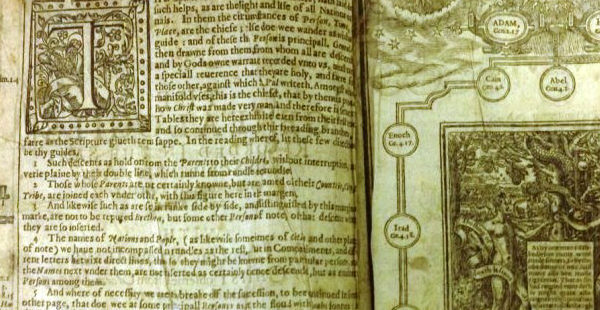
The Value of the King James Version for Modern Readers
Many believe that the King James Version (KJV) is antiquated and unnecessary for the church today. I’m not so convinced. I grew up in a household where we regularly used the KJV for personal and family devotions, and I still use it often. Despite common misconceptions, it is a quality, highly accurate translation. While you may not choose to use this translation as your go-to Bible, here is why you should acquaint yourself (and your family) with this remarkable Book.
The KJV Had a Profound Cultural Effect
We still quote it today, and not just Christians. ‘Skin of my teeth,’ ‘blind leading the blind,’ ‘drop in a bucket,’ ‘twinkling of an eye,’ ‘let my people go,’ and ‘scapegoat’ are just a small sampling of common English phrases that originated from the King James Version.
This isn’t surprising considering the competence of the original translators. King James assembled the most brilliant scholars and linguists of his day – men who routinely debated in Latin, or who confessed to being more fluent in the Biblical languages than in their native tongue. These are men who had a way with words. Those who are familiar with the KJV will notice far more biblical references in common culture than those who aren’t familiar.
The KJV Teaches English
I always find it slightly annoying when people think that adding ‘eth’ to a word makes it sound ‘old English.’ “Jason goeseth to the storeth” is not only atrocious, it demonstrates the lack of grammatical knowledge that most moderns have. Growing up with the KJV, I can speak Elizabethan English nearly as fluently as I can speak modern English (challenge me sometime!). It is a very orderly and regular dialect, even more orderly and precise than the English spoken today. And it is not old English, or even middle English; it is an older form of modern English. (Old English, mind you, looks like this: “Fæder ūre þū þe eart on heofonum, Sī þīn nama ġehālgod).
So what is the value of being able to speak Elizabethan English? There isn’t any, except that it teaches you to grasp grammar. It introduces you to longer sentence structures and more articulate English. It challenges you with new words (which yes, sometimes require a dictionary), and it gives you a taste for rhetoric, fluency, and beauty in a language. Newcomers rarely recognize the beauty of the KJV, but those who are familiar with it and can move past the initial challenges quickly recognize that language is more than a tool; in the KJV, it is also an art and thing of beauty. Familiarity with this book breeds better grammar, vocabulary, and writing.
The KJV Unlocks English Writing
I am troubled by how many people in the church, even voracious readers, are unable to work their way through older English writings. I’m not talking about Beowulf; I’m talking about the literature of the 1700s and 1800s, which many people can’t grapple with. This is a significant disadvantage, at least for Christians, since it prevents them from accessing many of the best books and commentaries in the English language. Even though many of these invaluable resources are free (Google Books routinely digitizes these treasures and posts them online), we often resort to the watered-down modern books that just summarize and skim over older works.
Those who can read the KJV can easily read English writings that came after it. If for no other reason, the KJV is valuable because it teaches us how to unlock the treasures of the English language.
Conclusion
The KJV had an illustrious career – nearly 400 years as the primary translation of the English-speaking church. While not everyone is going to use the KJV as their primary translation, I hope you can see the value of this translation. Even children (especially children!) will benefit from the KJV, because it teaches grammar, vocabulary, and fluency of English that few adults attain. Even more importantly, it is a beautiful and articulate translation of God’s Holy Scriptures.




I definitely see what you’re saying about the value of the KJV for historical purposes and for greater literacy and grammatical understanding. However, I would only recommend it to people who have a decent grasp of the textual history of the Bible.
Because the KJV was based on such a small number of manuscripts — the only few available at the time of translation — as well as an often faulty Latin Vulgate translation from Jerome, it actually does contain a lot of erroneous translations. Sure, very few are of any serious consequence, but they could still create misconceptions and lead to inaccurate thinking about what’s in the Bible if encountered by amateur Bible-readers.
So, aside from the reasons you mentioned, which are perfectly valid, I wouldn’t personally recommend the KJV to someone who isn’t well versed in Scripture and the history of its textual transmission. I fear that the disadvantages would outweigh the benefits.
Hi Trev,
Thank you for your thoughts on this topic. Obviously, I did not delve into the textual side of the translation, which is a contentious and challenging issue. I appreciate your viewpoint. However, I would actually disagree because – even if someone is completely unversed in textual issues – this is still the Bible that had a significant effect on generations of Christians. While there could be some misunderstandings, such people as Whitefield, Spurgeon, Lloyd-Jones, and many others used this version, along with millions of other Christians. I would not say that it had a significant negative effect on them or, to use your words, that the disadvantages outweighed the benefits. In fact, I might argue that the benefits (which were listed in my article above) potentially far outweighed any disadvantages that may have come. In the end, we may see this differently, but I do appreciate your thoughts and what you wrote. Thank you for interacting!
Blessings,
Daniel